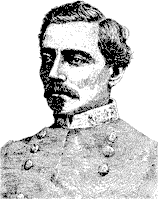 Albert Sidney Johnston
Albert Sidney Johnston
|
|
Albert Sidney Johnston
At the start of the Civil War it was widely agreed that the finest soldier, North or South, was Albert Sidney Johnston. But his Civil War career was definitely disappointing to the Confederacy. The Kentucky-born Johnston was appointed to West Point from Louisiana and graduated eighth in the class of 1826. After eight years of service he left to care for his sick wife. A failure at farming, he went to Texas and joined the revolutionary forces as a private. He rose to the forces' chief command as senior brigadier the next year.
As the second ranking general in the Southern army he was given command of the western part of operations. Establishing a line of defense in Kentucky from the Mississippi River to the Appalachians, he held it until it was broken at Mill Springs in January and at Forts Henry and Donelson in February 1862. Having to leave Kentucky and most of Tennessee, he fell back into northern Mississippi where he concentrated his previously scattered forces.
In early April he moved against Grant's army at Shiloh. In what was basically a surprise attack, he drove the enemy back. While directing frontline operations he was wounded in the leg. Not considering his wound serious, he bled to death. Grant, writing in his memoirs, considered Johnston as having failed to live up to earlier expectations.
|
|
Pierre Gustave Toutant Beauregard
The services of "The Hero of Fort Sumter," Pierre G.T. Beauregard, were not used to their fullest potential due to bad blood between the Confederate general and Jefferson Davis. The native Louisianan had graduated second in the 1838 class at West Point. There he had become a great admirer of Napoleon and was nicknamed "The Little Napoleon." Posted to the artillery, he was transferred to the engineers a week later. As a staff officer with Winfield Scott in Mexico he won two brevets and was wounded at both Churubusco and Chapultepec. In the interwar years he was engaged in clearing the Mississippi River of obstructions. In 1861 he served the shortest term ever-January 23-28 as superintendent at West Point. Southern leanings probably resulted in his quick removal. On February 20, 1861, he resigned his captaincy in the engineers and offered his services to the South.
Placed in charge of the South Carolina troops in Charleston Harbor, he won the nearly bloodless victory at Fort Sumter. "The Little Creole" was hailed throughout the South. Ordered to Virginia, he commanded the forces opposite Washington and created the Confederate Army of the Potomac. Reinforced by Joseph E. Johnston and his Army of the Shenandoah, Beauregard was lowered to corps command under Johnston the day before 1st Manasas Junction. However, during the battle Beauregard, being familiar with the field, exercised tactical command while Johnston moved troops to the threatened left. Both officers later claimed that they could have taken the Union capital if they had been properly supplied with rations for their men. This was one of Beauregard's first conflicts with Davis. Nonetheless he was named a full general from the date of the battle and early in 1862 was sent to the West as Albert Sidney Johnston's second in command.
Using Napoleonic style, he wrote the attack orders for Shiloh and took command when Johnston was mortally wounded on the first day of the battle. On the evening of the first day he let victory slip through his fingers by calling off the attacks. Controversy over his decision has raged to this day. The next day he was driven from the field by Grant's and Buell's combined armies. He was eventually forced to evacuate Corinth, Mississippi-his supply base in the face of Henry W. Halleck's large force. Shortly after that he went on sick leave without gaining Davis' permission; he was permanently relieved of his army and departmental commands on June 27, 1862, by special direction of the president.
Two months later he returned to the scene of his earlier triumph as commander along the Southern coast from the North Carolina-South Carolina line to the tip of Florida. He held this command for over a year and a half and was engaged in the determined defense of Charleston against naval and ground forces. Ordered north, he took command in North Carolina and southern Virginia while Lee faced Grant in northern Virginia. Gradually the two forces were pushed together in an awkward command arrangement.
In the final days of the war he was again second in command to Joseph E. Johnston, this time in North Carolina. Following the capitulation he returned to New Orleans and refused high rank in the Egyptian and Rumanian armies. Engaged in railroading, his reputation was tarnished by his association with the Louisiana Lottery as a supervisor. For a time he was Louisiana's adjutant general, and he engaged in historical writing including his A Commentary on the Campaign and Battle of Manassas.
|
 Pierre Gustave Toutant Beauregard
Pierre Gustave Toutant Beauregard
|


